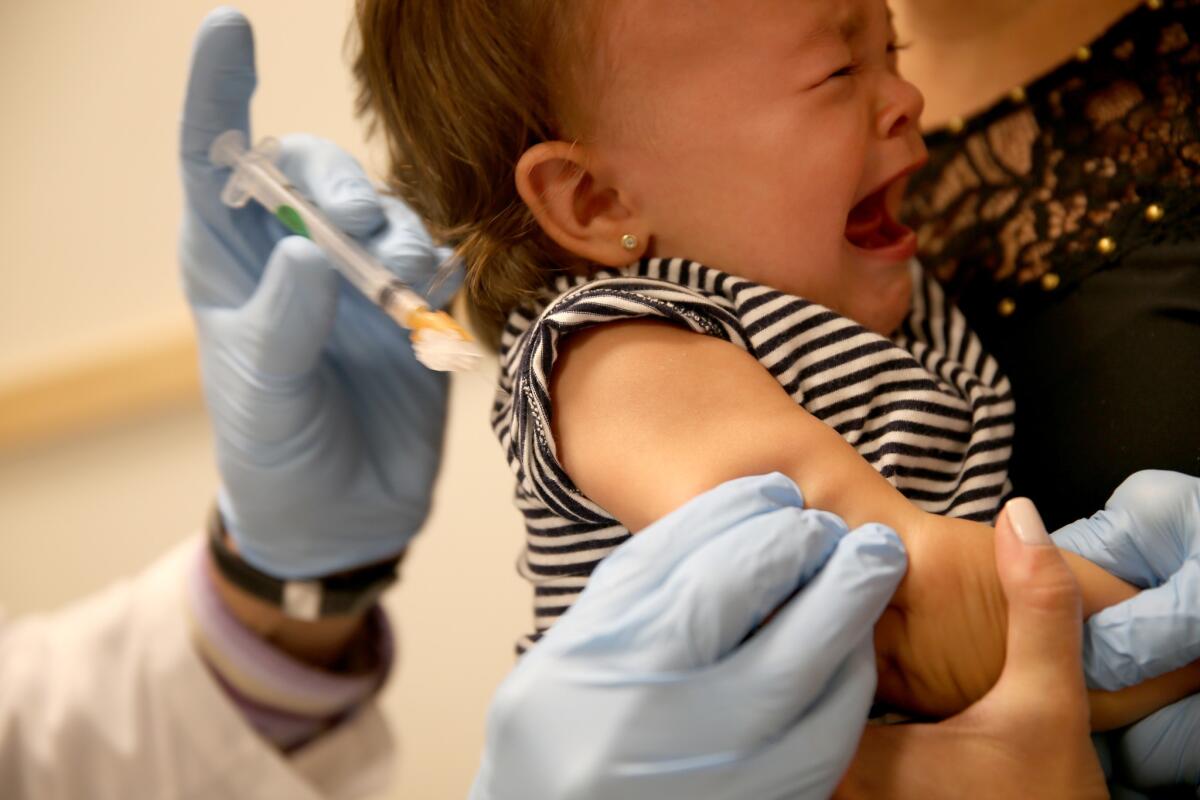Op-Ed: The measles outbreaks that matter the most aren’t happening here

Daniela Chavarriaga holds her daughter as pediatrician Jose Rosa-Olivares administers a measles vaccination during a visit to the Miami Children’s Hospital. There are still millions of children around the world who don’t have access to the measles vaccine.
- Share via
The measles outbreak linked to Disneyland has heightened public debate about the effect of anti-vaccination sentiment, and what can be characterized as a luxury of choice in the United States. Understandably, much of the dialogue is focused on whether to vaccinate kids. It’s critical to address these issues so we can dispel myths about immunization and reemphasize the important benefits of vaccines. But there is another conversation that we’re not having, one that is equally important to making sure measles outbreaks don’t happen in the United States: how to stop measles outside our borders.
Measles is still a major killer in many parts of the world where families often have no ability to choose whether or not to vaccinate because they simply lack access to the measles vaccine. Every day, about 400 people — mostly children under the age of 5 — die of measles complications. I have had many conversations in parts of Africa where mothers have told me that a child is not given a name until he or she has survived a measles attack.
As long as this highly infectious disease is a threat in many places around the world, it remains a threat to all of us. Though measles was eliminated from the United States in 2000, outbreaks occur here when unvaccinated travelers pick up the disease abroad and bring it back to the U.S. as an unwelcome, and often completely undetected, souvenir.
Last year’s outbreaks in Ohio, Washington state, New York, Nebraska and San Diego have all been linked to unvaccinated Americans traveling to measles hot spots. The virus in many of the recent measles cases in California is genetically the same as the one that Philippine health authorities have struggled to control since Typhoon Haiyan struck in late 2013.
The good news is that through vaccination, we can stop this devastating disease. For nearly a decade and a half, the Measles & Rubella Initiative has focused on eliminating measles. Before its founding in 2001, more than 562,000 children died globally of measles complications each year — an average of more than 1,500 a day. This partnership — whose founding partners are the American Red Cross, the U.S. Centers for Disease Control and Prevention, the U.N. Foundation, UNICEF and the World Health Organization — has helped control outbreaks around the world by vaccinating 1.8 billion children in more than 88 countries. It has reduced measles deaths by 75% globally, bringing down the number of estimated deaths to 145,700 in 2013. But there is still much work to do.
There are still millions of children around the world who don’t have access to the measles vaccine. In 2013, nearly 22 million children who should have received their first dose did not. It costs just $1 to vaccinate a child in low-income countries, making the measles vaccine one of the most cost-effective interventions in global health. Compare that with the $100,000 or more that the U.S. spends on tracking and managing the outbreak response for a single case of measles domestically. Or compare it with the month of household income a family in Ethiopia loses if a child is sick from measles.
What needs to be done to get vaccines to children who need them?
Simply put, we need more resources for the global effort. The United States has been an important leader in this effort, and it’s critical that stopping measles worldwide remain a priority. One way is for Congress to devote resources to this goal as it considers the U.S. commitment to the Global Health Security Agenda — a multinational partnership that aims to secure the world from infectious disease threats.
Measles anywhere is measles everywhere, including the United States. An investment in global immunization can help prevent future importations of the virus and — even more significant — can help ensure that no child anywhere dies of a preventable disease like measles.
Andrea Gay is executive director of Children’s Health at the United Nations Foundation and a member of the Measles & Rubella Initiative.
Follow the Opinion section on Twitter @latimesopinion and Facebook
More to Read
A cure for the common opinion
Get thought-provoking perspectives with our weekly newsletter.
You may occasionally receive promotional content from the Los Angeles Times.









